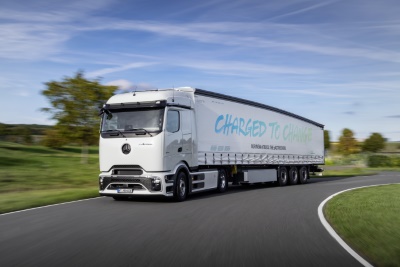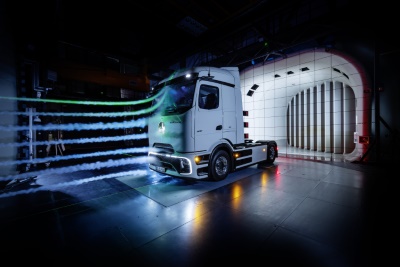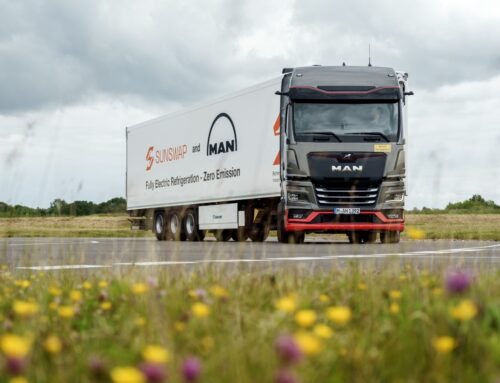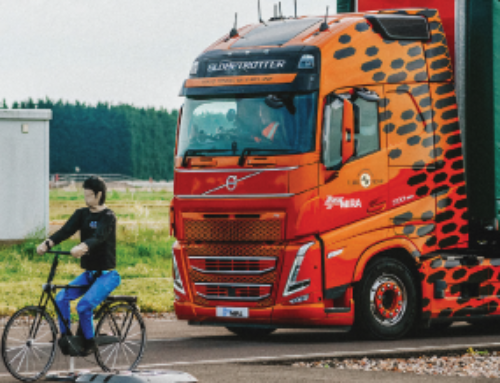Mercedes-Benz reveals production eActros tractor
 Details of the production version of Mercedes’s 44-tonne long-haul eActros 600 have been revealed.
Details of the production version of Mercedes’s 44-tonne long-haul eActros 600 have been revealed.
It has a claimed range of 500 km before recharging, enabling it to cover around 1,000 km a day if the charge can be topped-up during the driver’s statutory breaks. Payload with a standard semi-trailer is said to be in the region of 20 tonnes, and the price is around 2.5 times that of an equivalent diesel tractor unit.
Over its entire life, and including extraction and manufacturing, its savings in CO2-equivalent emissions are claimed to be 80 per cent compared to a diesel, with parity achieved during its first or second year of operation.
The eActros features a new 800-volt electric axle with twin motors giving an output of 400 kw (constant) and 600 kW (max). It incorporates a four-speed transmission.
There are two power take-offs: an electric PTO for equipment such as fridges which is available in various AC/DC formats, and an electro-mechanical unit for tipping-gear and similar pumps.
Power is provided by three LFP batteries, giving a total installed capacity of 621 kWh. After 10 years and 1.2 million km of travel, Mercedes claims 80 per cent of battery capacity will be retained. Driveline durability is said to be comparable with that of current Mercedes diesel trucks.
Although based on the diesel Actros’ cab, the eActros features aerodynamic enhancements including a solid rounded nose extended by 80 mm, an optimised bumper with undercab spoiler which extends to create a sealed motor compartment, a new roof spoiler and extended end flaps. Mercedes claims these changes have made a substantial improvement to the truck’s range.
Driver aids help maximise the output of the regenerative braking system, and the driver can choose between five different levels of retardation, including ‘one-pedal driving’ where regen braking is initiated as soon as the accelerator pedal is released.
Anticipatory drivetrain control automatically takes into account the topography, course of the road and traffic signs for the most efficient style of driving. Route information from the navigation system is now included to facilitate better recognition of the situation on the road ahead. This allows the driver to avoid unnecessary braking, accelerating and shifting to exploit the battery energy as efficiently as possible.
 Mercedes’ Multimedia Cockpit Interactive 2 is standard in the eActros 600. This continuously informs the driver about the charge levels of the batteries, the remaining range and the current and average energy consumption.
Mercedes’ Multimedia Cockpit Interactive 2 is standard in the eActros 600. This continuously informs the driver about the charge levels of the batteries, the remaining range and the current and average energy consumption.
Fleet managers can use digital solutions for efficient management of their fleets via the Fleetboard Portal. These will include an individually developed charge management system, such as smart control of all processes between the eActros 600 and the charging infrastructure, as well as a logbook with detailed information on driving, standing and charging times as well as consumption data.
There will also be a mapping tool that shows in real time where a vehicle is currently located, whether it is driving, stationary or charging, and how high the battery charge level is.
Around 60 per cent of long-distance journeys of Mercedes- Benz Trucks customers in Europe are shorter than 500 kilometres, which means charging infrastructure at the depot and at loading and unloading points will be sufficient. For all other uses, continual expansion of public charging infrastructure is vital in order to make the electric truck viable for long-distance haulage across Europe.
In addition to CCS charging with up to 400 kW, the eActros 600 will later also enable megawatt charging (MCS). From the start of sales, customers can order a pre-installation for this. As soon as MCS technology becomes available and is standardised across manufacturers, it is planned to be retrofittable for these models of the eActros 600. The batteries can be charged from 20 to 80 per cent in about 30 minutes at a suitable charging station with an output of one megawatt.
Mercedes will extend its MSC fuel card service to include an eCharge card for use at external charging stations.
With its ‘eConsulting’ range of consulting services, which constitutes part of the comprehensive ecosystem for improving total costs relating to e-trucks, Mercedes-Benz Trucks already provides support for customers with electrification of their fleets and depots. The focus is on choosing the right electric truck but includes planning, construction and configuration of the depot charging infrastructure and connection to the grid.
In addition, the consultants from Mercedes-Benz Trucks can assist with identifying potential public subsidies for infrastructure and vehicles. For depot design, Mercedes-Benz Trucks teams up with selected partners.
From mid-2024 on, Mercedes-Benz Trucks will sell chargers at its dealerships and offer a professional service to ensure a seamless charging process and vehicle uptime. The objective is to offer customers a cost-efficient overall package, from energy generation through to suitable charging infrastructure, to enable their entry into e-mobility.
 Mercedes will offer integrated financing and insurance solutions for the eActros 600 and the charging infrastructure. Financing offers cover all products ranging from mere use with integrated services through to ownership.
Mercedes will offer integrated financing and insurance solutions for the eActros 600 and the charging infrastructure. Financing offers cover all products ranging from mere use with integrated services through to ownership.
In addition, Daimler Truck Financial Services co-operates with Marsh, one of the world’s leading insurance brokers, negotiating effective and affordable insurance products and offering services tailored to customers’ business needs.
The time within which fleet operators can achieve cost parity with a comparable diesel truck using the eActros 600 in long-distance haulage will differ from country to country, says Mercedes, depending on electricity and diesel prices and toll systems.
In France and Germany, a low electricity price and the planned CO2-based truck toll, respectively, have a positive effect on the operational costs of battery-electric trucks. This means that the eActros 600 can be more profitable than a diesel long-haul truck within the average vehicle holding period of around five years, or after around 600,000 kilometres – despite a purchase price that is two to two-and-a-half times higher than the diesel equivalent. Government subsidy of e-trucks and charging infrastructure is a key lever providing support in ramping up the market.
The electrification of long-distance trucking will change the business model of transport companies and create opportunities for competitive advantage on several levels, the company adds.
For example, more and more customers of transport companies are attaching importance to CO2-neutral transportation of their goods – providers who cannot meet this requirement will miss out.
Mercedes will open UK orderbooks for the eActros 600 this year, and UK customer trials with prototype trucks will commence in the first quarter of 2024.
Series production is slated to start at the end of 2024, and production vehicles will appear on UK roads after that.










